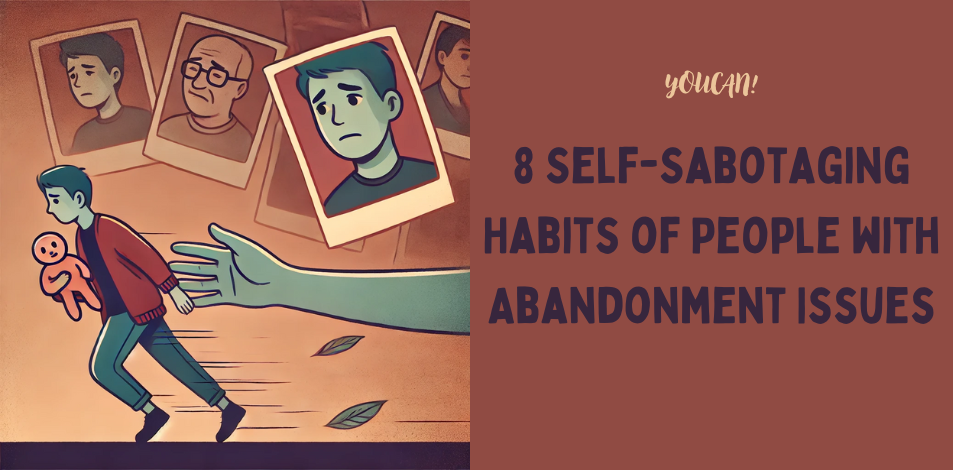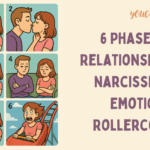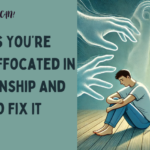
Abandonment issues can wreak havoc on relationships, whether you’re the one experiencing them or you’re with someone who is.
Often, if left untreated, abandonment issues cause a lot of pain and trauma for both parties. But they don’t have to stay that way. The first step toward healing is recognizing the signs.
Today, we’ll discuss eight toxic ways people with abandonment issues behave in relationships. But first, what are abandonment issues and what causes them?
What Are Abandonment Issue?
Abandonment issues refer to the fear that important people or things in your life will eventually leave you. Although not officially recognized in the Diagnostic and Statistical Manual of Mental Disorders (DSM-5), this term describes the anxiety and behaviors that stem from the fear of abandonment.
This fear can make a person clingy, insecure, jealous, emotionally manipulative, and overly controlling. These are often learned reactions to past experiences.
Perhaps the adults they looked up to as role models in childhood reacted the same way to rejection, or perhaps a close friend reacted the same way in early adulthood. This can also be learned from their experiences in previous relationships.
8 Toxic Things People With Abandonment Issues Do
In desperation, people with abandonment issues often behave in ways that can be extremely toxic, even if they don’t mean to. Understanding the nature of these behaviors can help you better understand yourself and allow you to build a healthier, more secure relationship.
- Constantly Doubting Their Partner’s Intentions
People with abandonment issues often find it difficult to interpret their partner’s actions directly. Instead, they may constantly suspect that their partner is planning to leave them or cheat on them.
If their partner is late coming home, they may immediately assume the worst, such as avoiding them or dating someone else.
Even simple actions, such as a partner being busy at work and not responding to text messages promptly, can be misinterpreted as signs of disinterest or a prelude to abandonment.
- Finding Flaws to Confirm Their Beliefs
People with abandonment issues often focus on identifying and magnifying the negatives in their relationships rather than appreciating the positives. This habit can lead them to obsess over every little flaw or mistake.
They constantly compare their partner’s actions to an idealized version of what they believe the relationship should be like.
They record these flaws as a way to protect themselves. When the relationship ends, they may convince themselves that it wasn’t meant to be after all.
- Excessive Jealousy and Possessiveness
People with abandonment issues often find themselves feeling excessively jealous and possessive in their relationships. This stems from a deep-seated fear of being left behind or rejected. When they feel a potential threat to their relationship, their emotions can take over, leading them to act in ways that can be extreme.
They may feel uncomfortable if their partner spends time with friends or even shares their day on social media. This insecurity can drive them to jealousy, leading to constant accusations or questions about their partner’s whereabouts.
- Prioritizing Their Partner and Ignoring Their Needs
People with abandonment issues often have a deep fear of being left alone or rejected. This fear may lead them to prioritize their partner’s needs over their own, which may seem like a way to keep the relationship strong.
However, this behavior can cause problems in the long run. When they sacrifice their own needs to please their partner, they may believe they are demonstrating love and commitment.
But in reality, they may be neglecting their own happiness and well-being. This can later lead to resentment and frustration. Therefore, it’s important to remember that healthy relationships are built on mutual respect and understanding, where both partners’ needs are valued.
- Withdrawal When Difficult
People with abandonment issues often react to relationship problems by emotionally withdrawing. It’s like panicking as soon as they sense the problem.
This behavior typically stems from a deep-seated fear of being abandoned or hurt. Instead of addressing the issue together, they may close themselves off or distance themselves, believing it’s safer to protect their hearts.
When someone with abandonment issues feels vulnerable or afraid, their instinct may be to flee, even if it means leaving the relationship. They may think, “If I just withdraw first, I won’t get hurt.” Unfortunately, this can lead to a cycle of loneliness and isolation.
- Over-Clinging to Partners or Loved Ones:
When someone with abandonment issues, they may feel on shaky ground when their partner isn’t around.
This can lead to constant texting, excessive calling, or a need for constant reassurance. It’s a way to cling to the people they care about, fearing that any separation will lead to abandonment. While this may stem from love and insecurity, it can burden your relationship and exhaust your partner.
- The Need for Control or to Be Controlled in Relationships
When someone is experiencing abandonment issues, they may believe that if they can control every aspect of the relationship, they can prevent their partner from leaving. They may try to dictate what their partner does, who they spend time with, or even how they should feel.
This controlling behavior often stems from insecurity and anxiety. People with abandonment issues fear their partner will abandon them if they aren’t “in control.”
On the other hand, some individuals with abandonment issues may find comfort in being in control. They may feel that having their partner make decisions for them can give them a sense of security and reassurance.
- Clinging to the wrong relationships to avoid loneliness
People with abandonment issues may feel that any relationship is better than no relationship at all. This can make it difficult for them to recognize the warning signs that a partner is not right for them.
They may think, “At least I’m not alone,” even if they’re in a relationship that makes them unhappy or anxious.
While it’s natural to desire companionship, being with someone who doesn’t treat you well can do more harm than good.
People with abandonment issues may need to work on building their self-esteem and understanding their value outside of the relationship. This can help them avoid the trap of settling for less than they deserve.
Conclusion
If you or someone you know is struggling with abandonment issues, it’s essential to seek better relationships. Building strong, supportive relationships with friends or family can help alleviate some of the fear of loneliness.
Remember, it’s okay to be single while you work on yourself and




